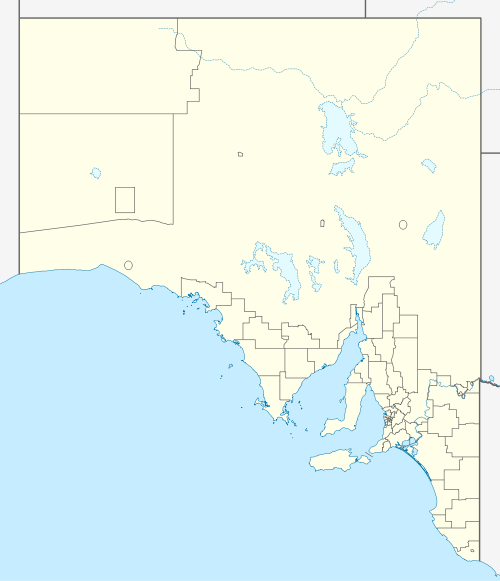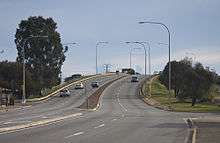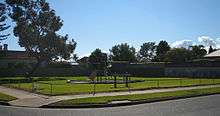Rosewater, South Australia
Rosewater is one of the western suburbs of Adelaide and is located 10 km north-west of Adelaide's central business district. Although mainly residential, there are many shops along Grand Junction Road and the closed Rosewater Loop railway line runs through the suburb. Rosewater is split in half by Grand Junction Road and bordered on the east by Addison Road, and on the south by Torrens Road.
| Rosewater Adelaide, South Australia | |||||||||||||||
|---|---|---|---|---|---|---|---|---|---|---|---|---|---|---|---|
 Eric Sutton Oval | |||||||||||||||
 Rosewater | |||||||||||||||
| Coordinates | 34.846°S 138.503°E | ||||||||||||||
| Population | 3,338 (2011 census)[1] | ||||||||||||||
| • Density | 2,380/km2 (6,180/sq mi) | ||||||||||||||
| Established | 1855 | ||||||||||||||
| Postcode(s) | 5013 | ||||||||||||||
| Area | 1.4 km2 (0.5 sq mi) | ||||||||||||||
| Location | 12 km (7 mi) from Adelaide | ||||||||||||||
| LGA(s) | |||||||||||||||
| State electorate(s) | Cheltenham, Port Adelaide | ||||||||||||||
| Federal Division(s) | Hindmarsh | ||||||||||||||
| |||||||||||||||
Originally, the area was mainly used as vegetable and dairy farmland but became more and more residential as the railway lines and Grand Junction Road were completed and as Port Adelaide grew and developed. Rosewater was also the site of the AdelaideRadio (VIA) maritime radio station system from 1912 to 1963.[2]
History
Prior to European settlement, the area was inhabited by the Kaurna people. They called the general area north of the Torrens River Yatala[3] retained in an early land division in the area and the cadastral Hundred of Yatala which is the lands administration unit defining real estate boundaries in the southern half of Rosewater and more than a hundred other suburbs north of the Torrens. Further north, the area was known as Yertabulti and Yerta Boldingga, which means 'land of sleep or death' according to John Phillip Gell.[4]
The original subdivision of Rosewater was created in 1855 by Philip Levi, when he subdivided section 1189 of the Hundred of Port Adelaide. The area just south of this, between Grand Junction and Torrens Roads, had been laid out by Osmond Gilles in 1847 and was known as "Yatala" (sections 422 and 2072, Hundred of Yatala). The area west of Levi's subdivision was farmland owned by William Henry Gray and was called Graytown (section 699, Hundred of Port Adelaide). After Gray's death, Graytown was subdivided and sold as residential lands in 1898. Many of the streets there are named after Gray and his family; Rosetta, Edith, Alice and Jane (now Jennifer Street) were all family members.
The generally accepted explanation of the name "Rosewater" is attributed to Philip Levi who, it is claimed, said "The locality was a swamp, and the perfumes arising from the stagnant water were so offensive that I thought the name of Rosewater would, to some extent, act as a corrective".[4] An alternative etymology came to light in 1945 when a Commissioner of Police report accompanying a parcel of human bone fragments discovered in Rosewater stated the following:
- "Mrs J. Ward, the owner of the property, where the bones were found, states that her father arrived here 100 years ago and took up land and used water from a wall on the site in question, for the manufacture of sand bricks. The water in the well was so pure that it was named "rose water" and her father often remarked to her that the district derived its name therefrom".[5]
As the population grew the area became crowded with subdivisions. The areas north and east of Levi's original "Rosewater" were called Rosewater North and Rosewater East respectively, while to the east of Evans Street were Dockville and Kingsnorth. East of these were the subdivisions of Brookesville, Ottoway and Ottoway East, which are now all part of Ottoway. East of Addison Road were Rosewater Gardens, Rosewater Gardens South and Stone's Farm (where the Flinders Hotel now stands), now part of Pennington. East and south of the "Yatala"[6] division were Kelmscott, Everton and Pennington, the latter two being part of the modern suburb of Pennington.
Rosewater Post Office opened around July 1877, the same year as the District Council of Rosewater was established out of parts of Yatala North, Yatala South and Queenstown and Alberton council areas. The post office closed in 1982. The council was abolished in 1899 by annexation to the Corporate Town of Port Adelaide. Rosewater East Post Office on Grand Junction Road opened on 1 December 1947.[7]
It was not until 1945 that the proliferation of separately-named subdivisions was put to an end when the Port Adelaide Council moved to reduce the number of postal areas, combining 13 subdivisions into what is now the suburb of Rosewater. These subdivisions were: Bayswater, Dockville, Graytown, Kelmscott, Kingsnorth, Kingston, Kingston East, Paddington, Perth, Rosatala, Rosewater East, Yatala and the original district of Rosewater itself.
Between the 1880s and the 1980s, Rosewater grew to become a reasonably large township with two hotels, a police and firestation, churches and many shops along Grand Junction Road. The Rosewater Gasworks was the largest local industry and many of the residents of the area worked in the timber mills, rail yards and woolsheds to the east of Port Adelaide.[3]

Rosewater was also the site of the AdelaideRadio (VIA) maritime radio station system, the sixth built in Australia and one of 19 around the country. Opened 1 October 1912 it operated from 8am to midnight every day of the week, and was one of the first points of contact for ships sailing south from Hong Kong and Japan. Apart from its major function of listening for ships' messages, Adelaide also handled traffic to and from the State telegraph system, and broadcast time signals to shipping. By 1963 the rapid industrialisation of the Rosewater area had increased electrical interference to the point where a move to a new site became necessary and the operation was moved to McLaren Vale where it operated until 1993 when it was shut down.[8]
In the 1980s the extension and widening of Grand Junction Road and the construction of the Redhill Bridge (over the Outer Harbor railway line) spelt the end for many of the small shops in the area and property value experienced a slump. Since the start of the 21st century, with the new development in and around Port Adelaide, the area is experiencing a revival of property values. Rosewater was served by Rosewater railway station from 1916 until 1988.[9] The railway remained open for freight trains until they were diverted to operate via the Mary MacKillop Bridge in 2008.[10]
Geography

Prior to European settlement the Rosewater area was mainly swampy marshlands of stagnant water. Today the area is almost entirely urbanised with only a small swamp area left next to the Redhill Bridge. The Eric Sutton Oval is one of two reserves in the area, with the other, Duffield Playground, a short distance away.
Residents
According to the 2001 Census the population of Rosewater is 3,274 and this is split almost evenly between male and female with only 8 more women than men. Of the local population 66% were born in Australia and 90% are Australian citizens, while the Indigenous population makes up 2.7% of the total.
Using the selected averages from the 2001 Census, the average Rosewater resident is 38 years old, with a median weekly individual income of $200–$299. The median family income is $600–$699 per week with an average household size of 2.2 people.
As a whole, the Rosewater area has an average religious affiliation (67.8%) with Christians accounting for 59.2% of the total population. The top ten religious affiliations (in descending order) were: Catholic, Anglican, Uniting Church, Buddhism, Orthodox, Pentecostal, Lutheran, Baptist and Islam.[1]
Industry
In April 1975, Clyde Engineering opened a locomotive manufacturing plant in Rosewater, transferring production from Sydney.[11] It closed in April 1986.[12]
Places of interest

- Rosewater Bowling Club[13]
- Rosewater Football Club[14]
- Rosewater Social Sports Club[15]
- Eric Sutton Oval
- Duffield Playground
- Mount Carmel College
- Rosewater Hotel
- Rosewater Uniting Church
- Wikimap marking the places mentioned in this article
Notes and references
- 2011 Australian Bureau of Statistics census data for Rosewater
- Adelaide Radio (VIA)
- Couper-Smartt, J (February 2003). Port Adelaide: Tales from a "Commodious Harbour". Friends of the South Australian Maritime Museum Inc. ISBN 0646420585.
- Cockburn, Rodney (1984). What's in a name? Nomenclature of South Australia. Gillingham Printers Pty Ltd. ISBN 095925191X.
- Manning, Geoffrey Haydon (1990). Manning's Place Names of South Australia. Adelaide: G.H. Manning. OCLC 25016107.
- The Official civic record of South Australia : centenary year, 1936. Adelaide: Universal Publicity Company. 1936. p. 32.
"Yatala" is preserved in the names of a suburb situated within the boundaries of the City of Port Adelaide of two districts—Yatala North and Yatala South—to the north of the City of Adelaide.
- Premier Postal History. "Post Office List". Premier Postal Auctions. Retrieved 26 May 2011.
- AdelaideRadio 1912 – 1993 by Paddy Wilkinson VIA 1978-1993.
- Rail service changes Transit Australia June 1988 page 112
- Port River Bridge Opens Catch Point issue 186 July 2008 page 8
- Clyde to move Sydney loco assembly work to Adelaide Railway Transportation September 1973 page 8
- Clyde Engineering Continental Railway Journal issue 69 March 1987 page 261
- Rosewater Bowling Club
- Rosewater Football Club
- Rosewater Social Sports Club
See also
External links
| Wikimedia Commons has media related to Rosewater, South Australia. |